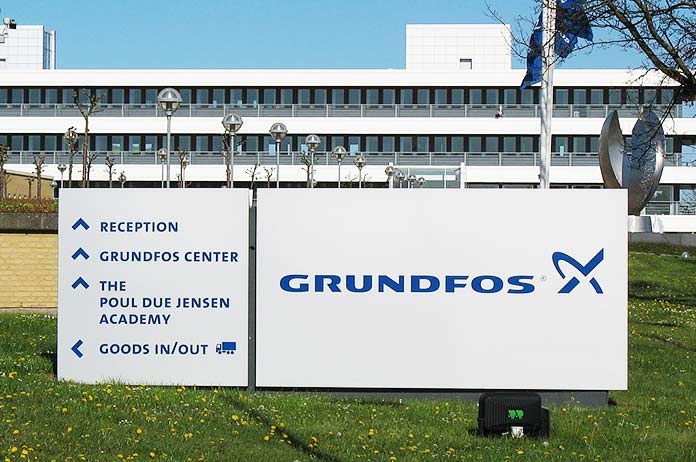Water Tech Giant Eyes Local Market
Grundfos, a pump manufacturer based in Denmark that operates at a global scale, is exploring the Cambodian market for opportunities in wastewater treatment, looking to cooperate with the government to reduce non-revenue water, boost water management efficiency and introduce the latest technology into the country.
 Grundfos, based in Denmark, is one of the world’s top providers of advanced pump solutions. Wikimedia Commons
Grundfos, based in Denmark, is one of the world’s top providers of advanced pump solutions. Wikimedia Commons
Aloysius Chan, water utility manager of Grundfos Singapore, told Khmer Times that his company seeks to break into the Cambodian market and establish itself as a pump solution provider, adding that many water plants in the kingdom could benefit from its technology.
Mr Chan said the Danish pump manufacturer will start operations in 2018, after a new team relocates to Phnom Penh.
“I cannot give you the full details of the project as we are currently on the negotiation table with a number of stakeholders,” he said.
“But, we have done a lot of research and checked a few water treatment plants in Cambodia, finally concluding that we can play a crucial role in increasing the efficiency of water usage, saving money and energy.
“We have a great project, that can help the kingdom save a lot of energy by using the right technology,” he added.
Grundfos specialises in energy-efficient pumps and smart pumping solutions for domestic and commercial buildings, factories and water plants, among other applications. Their solutions are typically based on renewable energy technologies.
The company recently launched a range of new intelligent products under its iSolutions portfolio, which boasts smart monitoring and adjustment functions to ensure the safe and economical operation of complex appliances.
Eric Lai, Grundfos’ business director of industry for the Asia-Pacific, said the company is ready to collaborate with the Cambodian government and the private sector to introduce the new iSolutions products to the local market.
“We are definitely open to work closely with the Cambodian government if there are opportunities.
“With pumps accounting for 10 percent of the world’s electricity consumption, the opportunity to leverage industry to integrate into pump manufacturing and reduce both financial and environmental costs is unprecedented,” Mr Lai said.
Um Sotha, a spokesman at the Ministry of Industry and Handicraft, told Khmer Times that the government welcomes Grundfos’ activities, adding that he hopes the company can help to bring the latest technology to improve wastewater management.
He said the government prioritises reducing the cost of water while increasing the availability of clean, quality water for daily consumption.
“We are mainly focusing on expanding the supply of clean, quality water to the people. For this, we are cooperating with a number of countries,” he said.
“Now we are working on reducing non-revenue water to keep production costs low, increase income and lower the price of water as much as possible.”
He also said the government is now exploring ways of upgrading the Niroth Water Treatment Plant in Phnom Penh, which opened in April, with the latest technology.
Mr Sotha noted some of the biggest challenges for Cambodia when it comes to water management included an old pipe system prone to leakages and insufficient water pressure in Mondulkiri, Rattanakiri, Stung Treng and Kampong Thom provinces during peak hours of water comsumption.
Grundfos’ Mr Lai said overcoming those challenges may require the government to take on new loans as current technology can be expensive.
Cham Prasidh, the Minister of Industry and Handicrafts, said in April that demand for clean water keeps increasing rapidly, reflecting the fast development of the country, especially in Phnom Penh, where the water authority connects about 14,000 new households every year.
“We keep investing to expand our water lines and build new water treatment plants,” he said.
“Water consumption demand will increase to 0.8 million cubic metres per day by 2025 and to one million cubic meters per day by 2030.
“By 2025, some 90 percent of Phnom Penh dwellers will receive clean water from the Phnom Penh Water Supply Authority and the other 10 percent will have access to alternative clean water sources.”
This article was originally published in the Khmer Times.